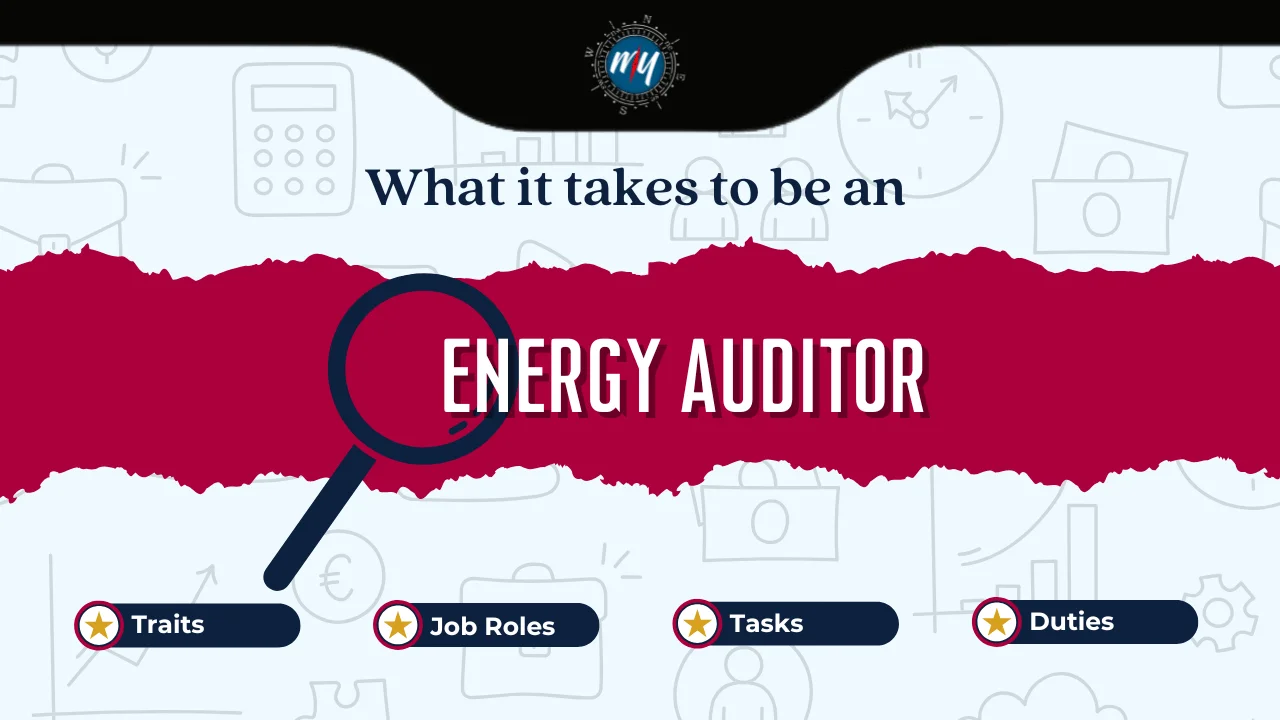How to Become an Energy Auditor?
Learn the essential steps, skills, and education needed to become a successful Energy Auditor and make a difference in energy conservation

In this Career Outline

Introduction to Energy Auditor
"An Energy Auditor's insight is the foundation of a greener tomorrow." - Olivia Brooks
An energy auditor, also known as a power evaluator, is an expert who specializes in enhancing energy efficiency in both residential and industrial settings. With the renewable energy market expected to grow rapidly, this profession offers significant opportunities for advancement. Energy auditors provide clients with practical advice that can save them substantial amounts annually. They assess buildings for energy efficiency, often using hands-on tests like the blower-door evaluation to identify energy loss by altering atmospheric pressure in a sealed space.
Steps to Become an Energy Auditor:
Step-1
Familiarize yourself with the duties and significance of this role. Energy Auditors assess energy usage and recommend improvements, making their job crucial in energy conservation.
Step-2
Consider pursuing a bachelor’s degree in environmental science, engineering, or a related field. Advanced degrees can enhance your expertise.
Step-3
Work in related fields like engineering or environmental management to build relevant experience. Gaining experience through internships or entry-level roles can be highly beneficial.
Step-4
Enroll in certification programs or training courses that focus on energy auditing. This will equip you with the skills needed for the energy auditor exam.
Step-5
Take and pass the required certification exams, such as those offered by professional organizations or energy efficiency institutions.
Step-6
Obtain certification from reputable organizations such as the Association of Energy Engineers (AEE) or equivalent bodies.
Step-7
Continue your education and stay informed about new technologies and regulations in the field of energy auditing.
Eligibility Criteria
| Eligibility Criteria | Description |
|---|---|
| Eligibility | Must possess at least 50% aggregate from a recognized institution (PUC/CBSE/ICSE/ISC, etc.) |
| Educational Background | High school diploma or equivalent. |
| Undergraduate Degree | B.Sc, B.Tech, or relevant diploma in Energy Engineering or a related field. |
| Postgraduate Degree | An M.Tech in Energy Auditing can provide advanced knowledge and open up further career opportunities. |
| Entrance Exams | Valid score in JEE-MAINS, CET, VITEEE, JEE-Advanced, or equivalent; some colleges may have their own entrance exams. |
- Must have at least 50% in 12th grade from a recognized board (PUC/CBSE/ICSE/ISC), though cut-offs vary by college.
- Secure a valid score in Entrance exams after 12th like JEE-MAINS, CET, VITEEE, or JEE-Advanced. Some colleges, like NMIMS and Symbiosis, have their own entrance exams if your scores are unsatisfactory.
- Obtain a B.Sc/B.Tech or Diploma in a relevant field to qualify as an Energy Engineer.
- Pursuing an M.Tech in Energy Auditing can enhance your qualifications and career prospects.

Not eligible to pursue this career?
Find out different career options based on your current academic accomplishments. Enquire with our career experts and build a roadmap to your career success!
Tasks to perform as an Energy Auditor:
Knowledge & Skills Required
Energy Auditors must possess a wide array of skills to succeed in their careers. Here are the key knowledge areas and skills needed to excel in this field:
| Knowledge Required | |
|---|---|
| Understanding of principles related to improving energy efficiency in buildings and industrial processes. | Skills in performing energy audits, including site assessments, data collection, and identifying energy-saving opportunities. |
| Develop proficiency in utilizing software tools and techniques to model energy usage and perform data analysis for energy audits. | Understanding of sustainable practices and green building certifications (e.g., LEED) to provide recommendations for improving sustainability. |
| Skills Required | |
|---|---|
| Energy Analysis | Technical Knowledge |
| Data Collection & Interpretation | Communication Skills |
| Regulatory Knowledge | Problem-Solving |
Understanding What are soft skills? and why is it important,as they complement technical abilities and enhance overall performance in the field of Energy Auditor.

The Knowlegde and Skills don't intrigue you?
Your career may not align with your interests. Identify them and match with careers requiring those skills for faster growth and success!
Job roles offered for an Energy Auditor:
Once you qualify as an Energy Auditor, numerous career paths open up:
These professionals analyze energy data and trends, offering insights and projections to organizations or clients. They deliver reports and offer recommendations based on their assessments.
Working for energy service companies, energy advisors handle customer inquiries about energy sources and installation. They may work on-site or remotely, focusing on sales and service delivery for renewable energy and efficiency technologies.
Primarily office-based, energy consultants often visit client sites to assess energy use and compliance with regulations. They interact with a variety of stakeholders, ensuring energy efficiency and safety.
Responsible for auditing and improving energy use in various sectors, Energy Managers ensure compliance with regulations, identify areas for improvement, and oversee programs to enhance energy efficiency and reduce costs.
Specializing in enhancing organizational performance, performance consultants identify and address gaps in growth and profitability. They work with businesses to improve outcomes through targeted strategies and recommendations.

Not sure where you fit in?
With countless career options, choosing the right path can be tough. Analysis and guidance sessions help clarify what to study, pursue, and achieve.
Career Opportunities for an Energy Auditor:
Energy Auditors can opt for various fields of work in the companies listed below:
| Symphony SUMMIT | M&G plc | International Trade Links |
| Atria Power | Worley | International Flavors & Fragrances |
| IGT | Elliott Davis | CIEL HR |
| Tricon Energy |
Colleges offering courses for Energy Auditor:
Here is the list of colleges offering the Best courses after 12th:
| MDI Gurgaon - Management Development Institute, Haryana | SIIB Pune - Symbiosis Institute of International Business, Pimpri Chinchwad |
| School of Petroleum Management, Pandit Deendayal Petroleum University, Gandhinagar | Amity University, Kolkata |
| MIT School of Technology Management, Pune | Kerala University of Fisheries and Ocean Studies, Kochi |
| Noida International University, Greater Noida | NTPC School of Business, Noida |
| Suresh Gyan Vihar University, Jaipur |
End Note
Becoming an Energy Auditor is not just a career choice; it's a commitment to making a positive impact on our environment. If you’re ready to take the next step towards a fulfilling and green career, connect with our experts at SetMyCareer for Career counselling after graduation. We’re here to guide you along your career goals and help you succeed in this exciting field.
In this Career Outline
You don't fit in as an Energy Auditor?
Find out your best suitable career by booking an appointment with our experts
Book nowGet In Touch
No. 14/595, 1st Floor, Nanjappa Reddy Layout, Koramangala 8th Block, Bangalore 560095






